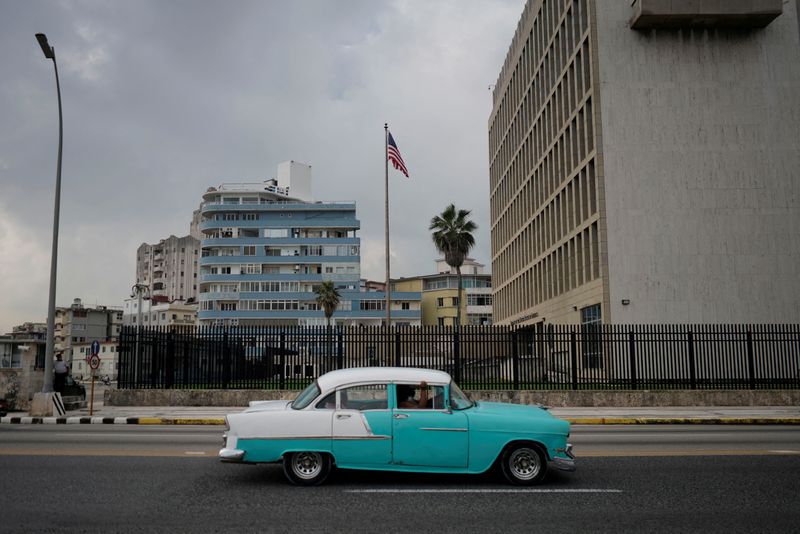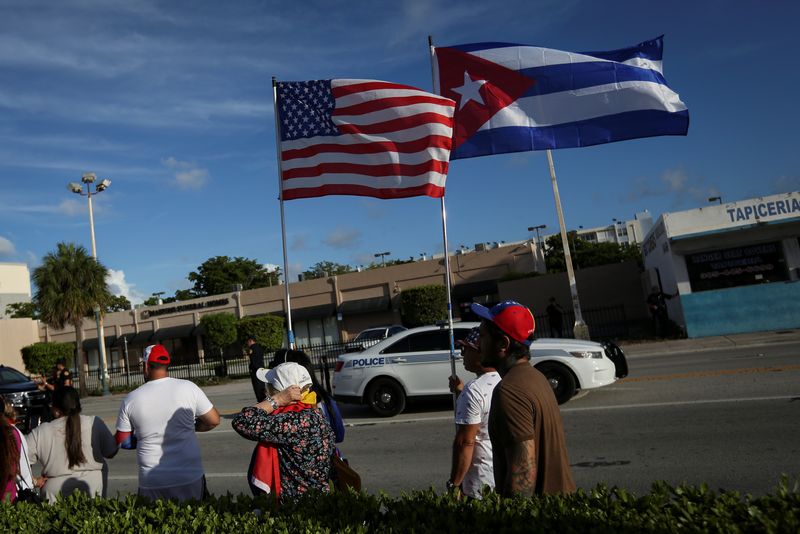By Daphne Psaledakis, Matt Spetalnick and Humeyra Pamuk
WASHINGTON (Reuters) -The United States on Monday announced a series of steps to revise its policy toward Cuba, including easing some Trump-era restrictions on family remittances and travel to the island and sharply increasing the processing of U.S. visas for Cubans.
The measures, which were rolled out after a lengthy U.S. government review, mark the most significant changes in the U.S. approach to Havana since President Joe Biden took office in January 2021.
But the announcement stopped short of returning U.S.-Cuba relations to the historic rapprochement engineered by former President Barack Obama, under whom Biden served as vice president. That included less crimped flow of remittances, fewer travel curbs and faster visa services.
U.S. State Department spokesperson Ned Price in a statement said the measures announced Monday were to "further support the Cuban people, providing them additional tools to pursue a life free from Cuban government oppression and to seek greater economic opportunities."
The State Department said the United States would lift the cap on family remittances, previously set to $1,000 per quarter, and authorize donative remittances to non-family members.
But it made clear that the United States would not remove entities from the Cuba Restricted List, a State Department list of Cuban government- and military-aligned companies with whom U.S. firms and citizens are barred from doing business.
"We are going to ensure that remittances flow more freely to the Cuban people, while not enriching those who perpetrate human rights abuses," an administration official said.
The United States will use "electronic payment processors" for remittances to avoid funds going directly to the Cuban government, an official said, adding that the United States had already engaged with the Cuban government "about establishing a civilian processor for this."
Biden officials have been mindful that easing restrictions on the communist-run island could lead to political fallout from conservative Cuban Americans, a key voting bloc in south Florida who mostly backed former President Donald Trump's tough policies on Cuba.
Senator Bob Menendez, the Democratic chairman of the Senate Foreign Relations Committee, said in a statement: "Today's announcement risks sending the wrong message to the wrong people, at the wrong time and for all the wrong reasons."
Trump slashed visa processing, restricted remittances, scaled back flights and increased hurdles for U.S. citizens seeking to travel to Cuba for anything other than family visits.
There were few details on how the new policy would be implemented, but officials said the steps would be implemented over coming weeks.
Cuban Foreign Minister Bruno Rodriguez, in a Twitter (NYSE:TWTR) post, called the U.S. announcement "a limited step in the right direction."
"The decision does not change the embargo, the fraudulent inclusion (of Cuba) on a list of state sponsors of terrorism nor most of the coercive maximum pressure measures by Trump that still affect the Cuban people," he said.
FAMILY REUNIFICATION
Among the changes is a plan to reinstate the Cuban Family Reunification Parole Program, which had provided a legal way for Cuban families to be reunited in the United States, and increase capacity for consular services.
Washington will aim to issue 20,000 immigrant visas a year, the official said, in line with a migration accord. The Biden administration is seeking to expand embassy staffing to handle the backlog but it was unclear how and when that might happen.
The U.S. embassy in Havana began issuing a trickle of immigrant visas to Cubans this month, making good on an earlier promise to restart visa processing on the island after a four-year hiatus.
The Biden administration will also expand authorized travel to Cuba, allowing scheduled and charter flights to use airports other than Havana, according to the State Department.
Washington will also reinstate some categories of group educational travel, as well as certain travel related to professional meetings and research.
Individual "people-to-people" travel, however, will not be reinstated. The category was eliminated by Trump officials who said it was being abused by Americans taking beach vacations.
The United States will also increase support for independent Cuban entrepreneurs, aiming to ease access to the internet and expanding access to microfinance and training, among other measures.
Biden promised during the 2020 election to re-engage with Cuba. But Havana's crackdown following widespread protests on the island last July led instead to sanctions on Cuban officials.
The Cuban government blamed the protests on meddling by the United States.

"We continue to call on the Cuban government to immediately release political prisoners, to respect the Cuban people's fundamental freedoms and to allow the Cuban people to determine their own futures," Price said.
The officials said a decision has not been made on whether to invite Cuba to next month's U.S.-hosted Summit of the Americas. Mexico and others have threatened to not attend unless all countries in the Americas are invited.
